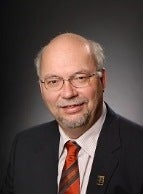Degrees
-
BASc, University of Waterloo

- MASc, University of Waterloo
- PhD, University of Waterloo
Research interests
My research interests bring together engineering and applied statistics. Often the problems being addressed involve aspects of experimental design, data analysis and mathematical modelling and therefore deal with a very basic aspect of chemical and environmental engineering, namely the collection, analysis and interpretation of engineering data. Broadly speaking the projects addressed by my research group fall into one or more of the following thematic areas:
- Statistical modelling and analysis
- Polymer reaction engineering
- Pulp and paper engineering
In the statistical modelling and analysis project area we are developing and evaluating new and existing statistical methods that are relevant to chemical and environmental engineering. One very promising development here is a new approach to designing factorial experiments based on Bayesian methods. Enhancements have been introduced to the classical approach to factorial design to make them more applicable in the chemical and process industries. Also, we are active in the areas of design of experiments and parameter estimation for nonlinear multiresponse models. These models arise when modelling many typical chemical and environmental engineering problems.
Within the polymer reaction engineering group, our efforts are directed primarily to modelling. For example, in copolymerization, models are being developed to describe processes using different monomer and initiation systems, as well as different reactor configurations and process types. The development of these complex mathematical models involve many aspects of applied mathematics, computer applications and applied statistics, including optimal design of experiments, parameter estimation for multiresponse nonlinear models, model discrimination and aspects of optimization. Some projects we have worked on in this area include:
- Software development for reactivity ratio estimation using the EVM algorithm;
- Model discrimination for distinguishing between the terminal and penultimate model;
- Optimal design of experiments for reactivity ratio estimation in constrained systems; and
- Optimal sensor selection.
Another research problem we have been working on relates to the processing of polymers. Here Monte Carlo simulation is used to model peroxide initiated degradation of polypropylene. This work has also led to a novel approach for estimating kinetic parameters used to describe this process.
In the pulp and paper engineering area our work is focused on the control, modelling and optimization of thermomechanical pulp refiners. The approach here combines mathematical and statistical modelling, process control and on-line experimental investigations. We have been active in developing control strategies for refiners which minimize energy and quality variations. We are also applying response surface methods to develop empirical process models for full-scale production refiners. In this work we are able to quantify the effects of plate life, predict pulp quality from operating conditions, and further enhance our process understanding. This work is continuing to include other unit operations in the pulp mill.